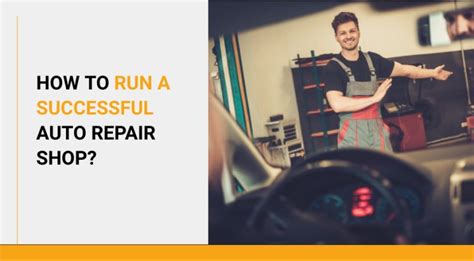How To Run A Successful Auto Repair Shop
Ronan Farrow
Apr 02, 2025 · 3 min read

Table of Contents
How to Run a Successful Auto Repair Shop: A Comprehensive Guide
Running a successful auto repair shop requires more than just mechanical expertise. It demands a keen understanding of business management, customer service, and effective marketing strategies. This comprehensive guide will equip you with the knowledge and insights needed to thrive in this competitive industry.
I. Laying the Foundation: Planning and Setup
Before you even turn a wrench, meticulous planning is crucial. This stage sets the trajectory for your shop's success.
A. Develop a Solid Business Plan:
A detailed business plan is your roadmap. It should include:
- Market Analysis: Research your local competition, identify your target market (e.g., high-end vehicles, budget-conscious drivers), and analyze their pricing strategies.
- Financial Projections: Project startup costs, operating expenses, revenue forecasts, and profitability analysis. Secure funding through loans, investors, or personal savings.
- Marketing Strategy: Outline your marketing approach, including online presence (website, social media), local advertising, and customer loyalty programs.
- Legal Structure: Choose a suitable legal structure (sole proprietorship, partnership, LLC) and obtain necessary licenses and permits.
B. Secure the Right Location:
Location, location, location! Choose a space with:
- High Visibility: Easy access and prominent signage are essential for attracting customers.
- Sufficient Space: Ensure ample room for repair bays, waiting areas, storage, and office space.
- Good Infrastructure: Reliable utilities (electricity, water), proper ventilation, and adequate waste disposal systems are crucial.
II. Building Your Team: Hiring and Training
Your team is the backbone of your auto repair shop.
A. Hire Skilled Technicians:
Employ certified mechanics with proven experience and expertise in various vehicle makes and models. Consider their ASE certifications and specializations.
B. Invest in Training:
Continuously invest in training for your technicians to keep them updated on the latest technologies, repair techniques, and diagnostic tools. This ensures they can handle complex repairs efficiently and effectively.
C. Foster a Positive Work Environment:
Create a positive and supportive work environment to improve employee morale, reduce turnover, and enhance productivity.
III. Mastering Customer Service: Building Loyalty
Exceptional customer service is paramount for long-term success.
A. Provide Transparent Communication:
Keep customers informed about the repair process, costs, and timelines. Address any concerns promptly and professionally.
B. Offer Competitive Pricing:
Research your competitors' pricing and develop a pricing structure that is competitive yet profitable. Consider offering discounts or package deals.
C. Build Relationships:
Develop strong relationships with your customers. A loyal customer base will provide repeat business and referrals.
IV. Leveraging Technology and Marketing: Getting Found
In today's digital age, an effective online presence is non-negotiable.
A. Build a Professional Website:
Create a user-friendly website with information about your services, pricing, contact details, and customer testimonials.
B. Utilize Social Media:
Engage with customers on social media platforms. Share updates, promotions, and helpful auto maintenance tips.
C. Implement Online Scheduling:
Offer online appointment scheduling for customer convenience.
D. Local SEO Optimization:
Optimize your website and online listings (Google My Business) for local search. This will increase your visibility to potential customers in your area.
V. Managing Finances and Operations: Ensuring Profitability
Efficient financial management is crucial for sustained profitability.
A. Implement a Robust Inventory Management System:
Track inventory levels closely to avoid overstocking or shortages of parts. Consider using inventory management software.
B. Monitor Expenses:
Regularly review your expenses to identify areas for cost savings without compromising quality.
C. Track Key Performance Indicators (KPIs):
Monitor KPIs such as customer acquisition cost, average repair order, and customer satisfaction scores to track your progress and identify areas for improvement.
By implementing these strategies, you can significantly increase your chances of running a successful and profitable auto repair shop. Remember, continuous improvement and adaptation to market changes are key to long-term success in this dynamic industry.
Featured Posts
Also read the following articles
| Article Title | Date |
|---|---|
| How To Test E Bike Battery | Apr 02, 2025 |
| How To Strap Dirt Bike In Truck | Apr 02, 2025 |
| How To Start An Alcohol Brand | Apr 02, 2025 |
| How To Trim A Pontoon Boat | Apr 02, 2025 |
| How To Remove Windshield Glue | Apr 02, 2025 |
Latest Posts
-
How Big Is Lake James Indiana
Apr 03, 2025
-
How Big Is Lake Delavan Wi
Apr 03, 2025
-
How Big Is Lake Delavan
Apr 03, 2025
-
How Big Is Lake Blue Ridge
Apr 03, 2025
-
How Big Is Jamaica Compared To Florida
Apr 03, 2025
Thank you for visiting our website which covers about How To Run A Successful Auto Repair Shop . We hope the information provided has been useful to you. Feel free to contact us if you have any questions or need further assistance. See you next time and don't miss to bookmark.
